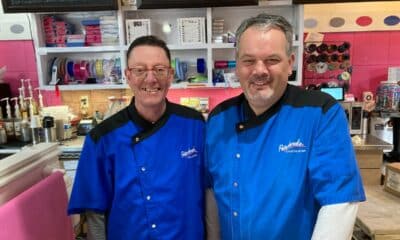City Government
Multi-Use Ordinance Changes to Guide New Development in Peachtree Corners [Podcast]
Published
3 years agoon
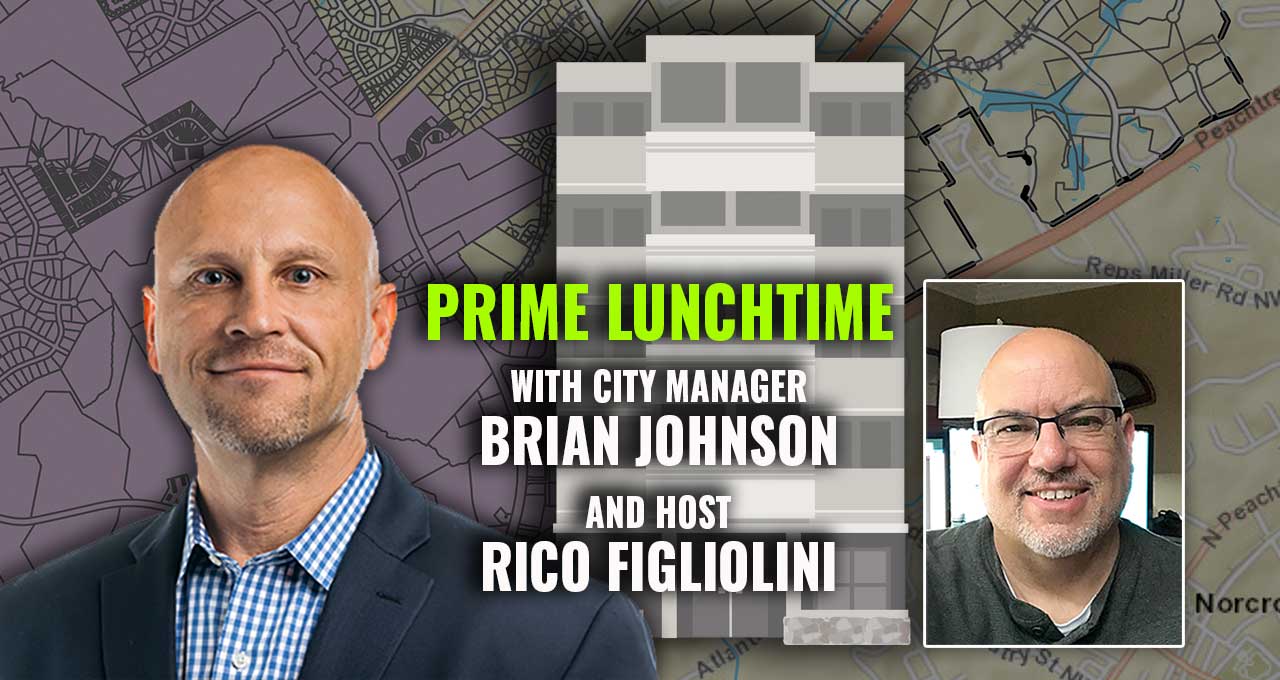
Prime Lunchtime with the City Manager, Brian Johnson
Join Rico Figliolini and Brian Johnson on this episode of Prime Lunchtime with the City Manager to hear about all of the exciting things coming to Peachtree Corners. Get updates on new restaurants coming to town, expansions, redevelopment, and details on the multi-use ordinance.
“The landscape of what we do out in and out in town has changed. And the pandemic has accelerated this change at a rate that would have taken a decade or more for us to slowly get into… This landscape is going to change. And everybody, including the city, has to remain flexible. (We) have to be as prepared to think outside the box as we possibly can. And we’re certainly trying to do that ourselves.”
Brian Johnson
Where to find it in the podcast:
[00:00:30] – Intro
[00:03:52] – New Restaurants Opening
[00:07:07] – Cornerstone Christian Academy Expansion
[00:08:28] – Pet Boarding Amendment
[00:10:24] – Multi-use Ordinance
[00:33:48] – Closing
Podcast Transcript
Rico: [00:00:30] Hi everyone, this is Rico Figliolini host of Peachtree Corners Life, and this
episode of Prime Lunchtime with the City Manager, Brian Johnson. But before we get to Brian, I
just want to introduce our main sponsor, which is Hargray Fiber. They’re a internet service
provider, as well as a provider of fast internet connections and business solutions. Whether
you’re a small business or a large business, they’re out there in the community providing that
service. So check them out. Hargray is doing their economic stimulus plan this year, and they
believe in small businesses and they want to help you out. So you may qualify for a one-year
free business internet and phone service. To check them out, just simply go to
Hargray.com/Business/Economic-Stimulus. And you’ll be able to check out what they’re offering.
They’re a big partner, not only with the businesses, but with the community they’re in. Like I
said, they’ve done things here with the city, with Curiosity Lab. Check them out, great supporter.
They are not the cable guy. They’re there when you need them. That’s Hargray Fiber. So I
appreciate them supporting not only the Peachtree Corners magazine, but the podcasts that we
do. So let’s bring in Brian. Brian, I just want to let people and reintroduce to people what we do
right? Every month after the city council meeting, when that happens the fourth Tuesday of the
month, we go into a meeting on a Thursday. We prerecord this actually live, and then we put it
out a day or two later as a simulcast. But we talk about all the city news, right? That’s going on.
And I’ve been fortunate to have a good co-host if you will, in you in the sense that every
question I have, if you have an answer, you give it to me. If you don’t, you find it. And on rare
occasions, you tell me Rico, we can’t talk about it. And because you’re not afraid of the
questions I give you. So I just want people to understand that that’s sometimes where I’ll ask
you stuff about executive sessions and what the city council is doing. You know, your honor
should tell me no, we can’t go there but it’ll be out at some point. So I’m glad that you’re there to
help me bring the real news, if you will, and the right information out to people. Which is
sometimes difficult to do in this environment.
Brian: [00:02:44] And conversely Rico, you know, the city appreciates what you do because you
provide yet another, this podcast provides yet another vehicle for information to get to people.
You know, as the internet, once it was created and these different sites and how they’ve kind of
evolved, people get their news from different places. And even those who are getting news
from, you know, the internet at some point they’re not all getting it from the same place. So we
as a city, try to do as much as we can to cross the spectrum on getting information that affects
their lives, that affects the community they live, work, or play in. And one of those is a podcast.
So we appreciate this vehicle to help educate those that may have missed it when it’s in some
of our other forms. And this is a good one. So, you know, again, thanks for making, thanks for
providing something that probably a lot of people in the community don’t realize is as important
as it is. Because there’s a lot of cities out there who don’t have these communication vehicles to
learn information from.
Rico: [00:03:52] For sure. And I appreciate that. I mean, I know the city’s out there doing a lot of
social media. The city’s out there with their own Peachtree network on YouTube providing. And
you guys have put out regular videos all the time. So, you know, you’re putting out stuff. And I’d
look at it, not just as news, but as information, right? Because you could get information from
anywhere from next door. You could get it from Facebook, get it from Twitter. Now we’re not
talking fake news. We’re not talking, we’re talking people getting information and putting it out,
but sometimes information can be distorted or wrong. And so I’m glad that we’re able to look at
what we’re doing and I can ask you about those things and you can help with bringing the right
facts out. Rather than people just thinking, you know, 20 times over what someone said and
saying, yeah, that bridge cost $40 million, you know. Because those things happen. People get
things wrong. And so this is a good place. Not only this, but Peachtree Corners Life and even
Capitalist Sage. The other podcast I do with Karl Barham. Now putting the information out there
about all sorts of things with the city did with the care funds for small businesses, you know. And
just making sure people understand, you know, what they can, what’s out there, you know? And
so this is cool. Let’s start right into it. City council was just this Tuesday. And the first thing that I
see is like, lots of businesses are actually opening even in this environment. And a lot of them
are either restaurants or places of brew, if you will. If I want to get a brew, right? So one of the
first ones that I saw was Kettle Rock Brewing applied for approval for their alcoholic beverage
license. So did Moe’s Original Barbecue, Uncle Jack’s Meat House. That’s hopeful, that should
be opening soon as well. And Royal Bistro on Spalding drive. Four new businesses. Did they all
pass by the way? Did they all get their approvals?
Brian: [00:05:49] They did.
Rico: [00:05:51] You know, listen, people look at COVID and what we’ve been going on for the
past year. You know, and then businesses closing. It’s good to see that there are businesses
opening.
Brian: [00:06:02] It is. I mean, you know, the landscape in Peachtree Corners as it is across city,
or, you know, in cities across the country are going through a transition. And there are big, there
is vacant, you know, space that wasn’t vacant before the pandemic. There are businesses that
have closed. We do have a pretty good mix for all of, for those who are closing or they’re scaling
back their in person operations or whatever. We do have still, you know, businesses that are
opening. And that is a testament, not only to the, you know, entrepreneurial spirit that we have
around here, but also the customer base. You know, our residents are still going out and
spending money on our local economy and that’s important. The more they do, the more money
the city gets you know, through sales tax and other means like business licenses to put back
into the community. You know, we appreciate all of those, you know, those purchases that are
made out in town.
Rico: [00:07:07] Yeah. In some cases I’m almost fearful, but in some cases it almost looks like
the COVID, the pandemic’s over. I mean, you’ve got these restaurants filling up and stuff. But
you know, I think they’re all doing it safely. You know, and it’s just going to be the way it is, right?
I mean, there’s just, there’s more exposure and stuff. God-willing, there’ll be less people getting
sick with the new vaccine coming out and stuff being used. So also, I mean, in some of the
things going on, Cornerstone Christian Academy is also looking to expand. They’ve asked for a
change of conditions on their almost 11 acre campus. They’re moving forward to doing a few
things also during this time.
Brian: [00:07:45] They are. They’re redesigning their campus and the way, you know, they stood
the school up in existing commercial office space. So it was created, you know, constructed for
a different reason than to being a school. And so as they have expanded in there, they’ve better
identified how they can make you know, what is really evolved into a mini campus, how they can
make it better for their students. They’ve identified an opportunity to demolish an existing
building and create kind of a quad for them to have some other you know, opportunities to do
things outside or to, you know, make the campus feel a little bit more like a campus. So moving
forward with that.
Rico: [00:08:28] Cool. There’s also a pet boarding amendment to the zoning code. Which
probably is, that has been needed for a while. So tell us just a quick bit about that. We do want
to get into the multi-use ordinance. That is really the meat of what’s been going on here. But tell
us a little bit about that.
Brian: [00:08:45] Well, in the pet boarding is just, you know, us better you know, identifying the
places and the prerequisites for a space to be used for pet boarding. Prior to this, it was a little
bit, you know, a little bit wide open. A little bit, you know, there’s a lot to be determined on each
specific case, which made it sometimes difficult for somebody looking to do something because
they didn’t know what the parameters were going to be. And then it puts counselors sometimes
in difficult positions that they were having to like, you know, decide who does and doesn’t get,
you know, that exception. And this is pretty common when, especially in new cities like ours,
when you know, the day we became a city we took Gwinnett county’s code and we just adopted
it as ours. Which, you know, we had to have that and it was an expedient way to have
something in place. So it was great. But that is code that, you know, Gwinnett County is a very
large area with very diverse types of land uses. I mean, you got everything from urban down
here at the Southern part of the County up to rural spots up when you get up near, you know,
Brazelton and Auburn, Georgia, and that kind of stuff. And so they have to have code that
applies to the whole thing. And as you know, it doesn’t always fit a more urban in a setting like
ours. And so we, as we identify those needs, we address them and the pet boarding was
another one and we addressed it. And we’re going to be better positioned to rule on that the
next time somebody presents something to the city.
Rico: [00:10:24] So, you know, that’s a great segue because part of what’s going on now with
the multi-use ordinance and the adjustments of the code there is actually right to address. And
systemize what should be in place with incentives. So then this way there’s no like you said,
case-by-case adjustments, right? This way a developer can come in, a business can come in
and they can say, oh, okay, those are the rules. I can follow those rules. I know what to do now.
Versus this is real vague. Who am I going to speak to about this? So why don’t you give us you
know a quick overview of what the intent is of revising the ordinance of the multi-use.
Brian: [00:11:09] Alright, so we do need to start with talking about you know what I said a little bit
earlier, and that is the transition that the city’s landscape is going to be, you know, going through
over the next X amount of months. Or maybe even years. You know, the pandemic has changed
a lot of things and it’s put a lot of stress on a lot of different types of uses. So three of them
specifically, which could all apply to this are going to be a couple of things. One is commercial
office space. Commercial office space, which we were very lucky to have a lot of jobs here. You
know, before the pandemic, we were about 45,000 people, about 45,000 jobs that actually had
people in, you know, butts in seats here. That’s changed now with COVID in more you know
embracing of virtual work. And so there is a commercial office space transitioning.
Rico: [00:12:11] Does the city, not to interrupt you, but just does the city have any idea how
many people are actually working in the city now?
Brian: [00:12:17] Right this second? No. I don’t know of anybody who does, because to be
honest with you. I don’t know if the companies themselves know what they’re going to do yet.
Some companies have said, we’re going to try to do all virtual or almost all virtual. Some have
said this virtual thing does not work for our type of business and we want to come back as soon
as possible. And then they’re having, if they’re tenants, they’re having their landlords make you
know, changes to the floor plans by actually going away from the open floor plan. They now
want more walls separating people, because that allows them to get away from maybe, I guess
the risk of, you know, aerosolized virus. And so, and then you’ve got the hybrids which is, okay,
when we get back to normal, our normal’s not going to look the way it did before the pandemic.
An example, of that’d be like, and I’ll just go round number. I would say there’s a company that
had a hundred employees. Before the pandemic, all one hundred employees came to work at a
location. Well, the pandemic had forced them to of course, work through how to, you know,
provide their services virtually. Well, now they’re like, you know what? We don’t have to have
everybody come in all at once. So they’re telling their landlord, look, we need to downsize or
change our space. And even though we have a hundred employees, I only need say 60 seats,
and I’m going to be rotating people through. Not many are going to have their own office.
They’re going to kind of hot desk that, you know, you’ll be in the desk one day while I’m working
from home. And the next day I fall in on that desk and you’re working from home. And so, you
know, a lot more into that, we work type of space to regis. So anyway, that, you know, look. We
don’t know how it’ll end up and companies are going to be different. But yes, we are seeing a
fundamental change in commercial office space. So that’s one where we have a lot of that we’re
going to see a lot of change. Two, we also have retail. You know, retail was undergoing an
evolution in and of itself before the pandemic. The bricks and mortar retail. As people had
started to trend towards ordering things more online, Amazon and that kind of thing. There were
less people going to bricks and mortar to shop because they didn’t feel like they needed to. And
then the pandemic only accelerated that. So we have a lot of retail, you know, space that is
trying to figure out how to best you know, be there. Because retail, bricks and mortar retail can’t
go away completely. But then the old way of doing things where the only way for you to get a
pair of pants is to go to a clothing store, see if they had it, try it on, buy it leave, is not the case
anymore. And so that’s the second thing that we’re really seeing. An accelerated, you know,
metamorphosis. The third one is multifamily housing. And by multifamily, I’m really talking about
housing that’s not detached housing. You know, the standalone house. But multifamily, meaning
more dense housing, more units under one roof. That could be everything from townhomes that
are owned. All the way through condo stack flats, to just even apartments. But all of that is, the
pressure to build that is increasing as more people who had worked in maybe companies that
have headquarters in Midtown Atlanta, or wherever that those employees now realize they don’t
have to go in every day. Or they don’t even have to go in a lot, you know, most of the time. And
then that means that their, where they live has expanded much beyond where it used to be. You
know, if you want to live in Peachtree corners, but you worked you know, downtown, you add an
hour in the car each way, every day. And that could affect quality of life. And some people are
like, I don’t want to do it. So they found a place to live close to the downtown. Now they don’t
have to worry about that the same way that they did before. So now they’re thinking, you know
what? Peachtree Corners is an option and I can still work at a building, a company that’s
headquartered down there. So. There really is a big push for housing here. And that push for
housing combined with the changes in the other two, you’re starting to see redevelopment
needs to get presented to the city. And of course, we’ve talked about the redevelopment
authority and this will be a tool. All of that is a long way of me saying the mixed use
development ordinance that we just amended is a tool, a significant tool we think will help guide
the city’s actions as these forces that I just talked about are colliding together. And we’re starting
to see an increase in applications from developers saying, Hey, we have this parcel. And it’s X
amount of acres and it’s got Y amount of square feet of existing building on it, but the building is
under utilized or it’s vacant. And then we want to redevelop it in a certain way. We knew that we
needed to address this. And the way to do that is through mix of uses versus one particular use.
And the reason that you do it. And, you know, this Rico having been in, you know, land planning.
The mix of uses or mixed use is a popular way to develop property because it increases the
odds maybe in some cases only a little bit. It increases the odds of success of the uses that you
have mixed on one parcel. Because you now create a micro economy, if you will. Instead of if I
had 10 acres and you know, instead of putting all housing on the 10 acres, I might be able to
mix in some retail and commercial. And as a result, I can get higher yield on my property. But
also all of the vacant units of whatever type are filled at higher rent rates or lease rates or
purchase rates. Because instead of say a coffee shop being in a strip mall, and it’s only
customer base are the ones that have to get in the car and drive to that location. You put a
coffee shop in an area where there’s already a lot of residential units, and now you have the
convenient walk-up traffic too. Walk up traffic is more inclined to go to that coffee shop because
they don’t have to get into their car. It’s convenient.
Rico: [00:19:19] This is exactly why when town center was initially developed, was talked about
putting a, now it will change obviously, a boutique hotel, the Indigo hotel with 160 odd rooms
and an apartment. A seven story apartment building with another 160, right? Now the Indigo
may go away because hotels are essentially having issues, right. Lower vacancies and stuff.
And that may not change for the next decade. Especially when there’s a lot of other hotels in the
area, right? But apartments, like you said, multi-use. You know, if there’s a coffee shop
downstairs, like the Revelator that was downstairs, not that that was the best coffee shop at
town center. But if there was, you know, an apartment complex there full of people that might
not have gone out of business. There may have been more usage. And quite frankly, like you
said, there are people moving. They may decide to move away from Midtown. Now they’re
looking not just being close to a place, but also the amenities of it, right? Bars, nice restaurants,
good places to go. Some good energy if you will, of that. That, you know, people may look and
said, well, Peachtree Corners is not like that, right? It’s not like that right now. A decade from
now, because business evolves right, will be different. And that’s what this is supposed to help,
right? So yeah, right. I mean, it’s supposed to get other businesses type here and mix it all
together and create some energy there that people are going to want to move in.
Brian: [00:20:50] Well, look, even before the pandemic, we are in a Metro area, a metropolitan
statistical area, Metro Atlanta. That has a population that’s been growing for, you know,
centuries really. And we know that population is going to get denser and denser in Peachtree
Corners, whether we like it or not. The key for the city was to try to have the tools in place to
manage that growth. And so the pandemic has merely just accelerated it. And so we wanted to
preemptively create something that might help. So the points you just made, which is growth is
coming, it’s coming even faster than, you know, there’s more of a tidal wave if you will, of it
coming. What can we do to capitalize on this? A, you know, to make sure that the growth that
does happen is done in a way that has long term success. And B sometimes prevent some
unforeseen, certain, you know, affects of maybe letting things happen in a way that was not set
up for success. You know, and oftentimes that a good way to say that is, is if you allow too much
of any one thing to happen in one area, sometimes that can create problems in the future as
things change. And so mix of uses. So what we’d want to do is we wanted to encourage a mix of
uses. It’s what people want. People want amenities and then amenities want people. And so
there’s this symbiotic relationship. We wanted to create that. Then we wanted to incentivize it.
And by that, I mean, we said, alright, we can have a mixed use development and we just offer it
up and that’s all fine. But oftentimes what happens is developers come to us and, in all cities not
just us, and they are looking for density. Because, as you know, density is the currency of
development. The more dense a developer can make a property, the more money that he or she
can make. And so they’re always coming to the city and wanting more density. Well, before we
had a base line density of 32 units per acre on mixed use, and that’s what we inherited from the
County. And so when we amended this, that was just approved Tuesday night. We knew that we
wanted to do something with that because what was happening and what happens with the
County currently, what was happening with us is developers are coming on mixed use saying if
you want us to do a mix of you so we understand why you like us to do a mix of use. But if you
want us to do it, we need more density than 32 per acre. And we had to do on a case by case
basis, allow them to essentially lobby the mayor and council, make their argument. And council
had you know, they’re put in difficult positions every time of choosing who gets it this time versus
the next time, all that kind of stuff. And so we knew we wanted to have a standard. And then the
other thing is, is we knew we wanted to maybe incentivize that mix of use. So for you to qualify
for this one, as we wrote it, we kind of made it a more incentive based mix of use. So for
instance, if you want to mix of us, you’ve got to have at least three uses on the property. And
two, if you want anything above, what was the baseline of 32 per acre. Which is again, been on
the city’s books since our inception. That’s what Gwinnett County has. If you wanted more than
that, you have to earn it. That’s the only way to do it. And so by earn it we created an incentive
table. And that incentive table basically has a list of things that the developer could include in a
mixed use development to earn more density. Things like donating property to the city for open
space or trail system. Making it lead certified, adding smart home technology to the units,
sub-metering apartment units so that they could be converted to condos. Putting micro mobility
or, you know, E-scooter corrals and charging stations, electric vehicle charging stations,
adaptive reuse of existing office buildings. Those are just some of the things on the list that you
could, a developer could come in and say, alright, I’m doing this. And we would say, okay, well
you just earned a half a unit per acre increase in density. You want more, you’ve got to do more.
At the end of the day, the developer could get more density. When we capped it at 45, we also
capped the maximum height at 120 feet or 10 stories. By the way, the, our old code had a 25
story max. Yeah so we’re not ready for 25 story buildings.
Rico: [00:25:49] That was based on Gwinnett’s.
Brian: [00:25:51] Gwinnett still has that and that’s fine. And you know, clearly the city had never
approved that. But anyway, you know, we also looked at other aspects of the mixed use and we
made it our own. Because before it was what we inherited, now we made it our own. But we
capped it, we capped the density at 45 units per acre. And most of the additional density comes
at a half a unit per acre. And so to get to 45, you’ve got to do a lot of stuff. But the more density
you earn, the better that product is for the community. The more additional value adds, you
know, aspects of that development this community will get to enjoy. And that development will
have to attract a better quality tenant, whether it’s tenants in the residential units, tenants in the
commercial or retail spaces, but a better quality tenant. We get a better product. We get things
that, you and I already live in the city, but we get places that we may want to go to you know, to
frequent. And we don’t necessarily live right there, but it’s stuff that we can enjoy. Other
residents can enjoy too. So that was the impetus for this, the brainchild for it. And we’re kind of
excited about what it could offer the redevelopment authority that just was stood up. Just elected
its officers yesterday, as a matter of fact. And they’re getting ready to start real hardcore, you
know, assessment of their area and seeing about maybe opportunities for redevelopment. So
we’re excited about it. It’s a unique ordinance and we hope to put it to good use.
Rico: [00:27:29] Yeah, I think that the city is moving in the right direction by doing that. It cuts
red tape. I mean, it just, it allows for a certainty versus you know, lobbying for what someone
may want. But it also doesn’t preclude the planning commission or the city council from still
putting conditions on a, on a zoning, right? On asking for plans that the site plans that have to
be adhered to, and if it’s changed, it would come back again. So it still gives the council flexibility
to be able to work at development. But at least give some certainty to people that you know,
that’s a baseline that they can work from, right?
Brian: [00:28:11] Yes. I mean look, it helps manage expectations of all parties when you have it
codified, like we do in an ordinance. You are right that there, nothing precludes planning
commission, as it works through from making recommended conditions, adding that to an
application. And of course, mayor and council are the final authority on this. So this is at their
discretion at all times. Including, you know, they have the right to amend the ordinance. Which
they certainly, if things come up, this is an ordinance that we started out as one that applies
citywide. There are a few examples. There are a few cases in the ordinance in which there’s a
specific reference to an area of the city. And a good example would be, we want this to apply to
parcels that are eight acres or greater, except for Tech Park. And Tech Park, given how it was
developed, we are allowing it to be as little as five acres in the case of Tech Park. Because you
know, it’s a unique you know, it’s a unique development that has adaptive reuse opportunities or
needs as the case may be that may be on parcels that are not as big. You know, at eight acres
or bigger. So there are a few specific geographic references, but right now this applies citywide.
And, you know again, there are some good opportunities out there for this to be put to good use.
Rico: [00:29:43] Yeah. And I imagine that already there are probably, I think last time we spoke
there may have been three companies or three developers looking at least at coming in you
know, to make a proposal on some of the commercial buildings within Tech Park or in the area,
right. There’s even a hotel that might actually, that someone was looking at an investor was
looking at, I think of converting or doing something with in the city, so.
Brian: [00:30:07] There is definitely, certainly some unique again, adaptive reuses of existing
office buildings or excuse me, buildings including hotels that are being explored nationally as
well as here in Peachtree Corners. So again people are thinking outside the box because the
landscape of what we do out in and out in town as the term is, has changed. And the pandemic
has accelerated this change at a rate that would have taken a decade or more for us to slowly
get into. But you know how much we order online has really gone. How we’re going to work has
changed. How hotels operate and even just get their feet underneath them. I mean, they don’t
even have their feet underneath them yet because travel restrictions are such, so this landscape
is going to change. And everybody, including the city, has to remain flexible. Have to be as you
know, prepared to think outside the box as we possibly can. And we’re certainly trying to do that
ourselves.
Rico: [00:31:14] For sure. I mean, we spoke about not only you know, the way people live and
work, but how they traveled. You know, less traffic on the roads, less use of certain
intersections, just because of the nature of the beast and what’s been going on now. Are we
going to come back in a year or two? Who knows? But like you said, but like you said before,
businesses are rediscovering or discovering that they don’t need a 15,000 square foot facility.
Maybe they only need a 5,000 square foot. So these are things that are not going to go away.
These are things that will probably stay. That’s part of that issue, right? When people learn that
they could do something a certain way, why should they go back? They’re going to end up
continuing to do that. Just because it’s more profitable that way, or it’s better living standards
that way. Right? I mean, I think people want to be able to work at home, get paid time off when
they can. Unlimited paid time off is a big thing that came out of COVID also. That it used to just
be technology, but now they put it out because if you’re working from home can you even
investigate how much time you have off? So, I mean, it’s kind of interesting how we are
evolving. There’s the good side and the bad side. But I think the city has taken a dramatically
good, great step towards making this easier because there will be changes. I mean, national
hotel chains are deciding which hotels they’re going to be shutting down, right? Major
corporations that have 40 offices across the Southeast may decide two or three of them need to
go away. So I think you guys are doing the right thing out there and still retain the ability to
condition developments as they needed on the specific basis. But, you know, we have to attend
to what’s going on. Belk’s, the forum, the town center, Jimmy Carter Boulevard, you know
Holcomb bridge, all the redevelopment stuff, the empty places that we have. You know, at some
point they do need to be, you know, they’re going to be busy. With the interest rate as low as it is
and with money being available, there’s going to be a lot more development. The faucet’s going
to open wide soon, give it another year. And you know, things will be in place to move way
faster than they’re doing now, I think. So I appreciate you coming out and you know. Coming
out well, you’re in the office there, so you don’t have to go too far, I guess. Neither do I, right?
Brian, I appreciate you being with me and answering questions and going through this. You
know, it’s a great city we live in and I’m glad that we’re able to do what we do. And you know, it’s
all good.
Brian: [00:33:48] Yeah, no, I mean, it’s always my pleasure Rico. Again, thanks for, you know,
giving the city this, you know, forum to, you know, help get information out. To give people a
glimpse into what the city’s looking to. You know, what it’s dealing with. You know, there are
other ways to learn that, but this is sometimes a good one because you get to ask me, follow on
questions that you, as a resident, it comes to your mind. So, you know, it works out well. So, you
know, keep up the good work and thanks for what you’re doing for the community.
Rico: [00:34:18] Well thank you, Brian. And thank you everyone for watching or listening to this.
Or if you’re reading the transcript, this has been Prime Lunchtime with the City Manager, Brian
Johnson. The great city of Peachtree Corners. My name is Rico Figliolini, your host. And I
appreciate you being here. Like our Facebook page or the YouTube channel to be able to get
notified when we go live on these things. Because we’re moving towards more of that, right. So
stay safe out there and be well, and we’ll see you next time.
Related
City Government
Crime and Safety Concerns Dominate Town Hall Meeting
Published
1 month agoon
March 27, 2024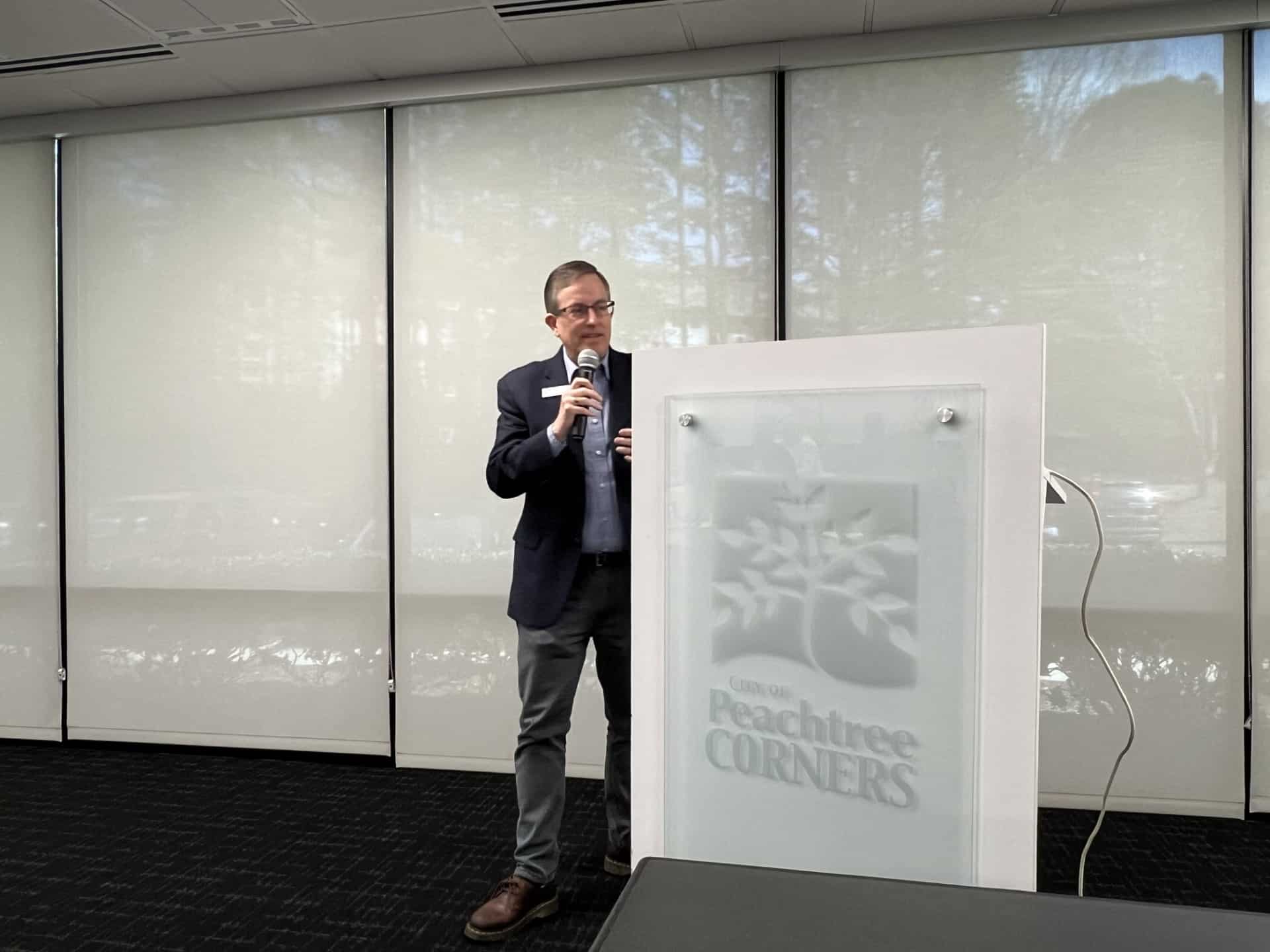
Besides his monthly newsletter, Peachtree Corners City Councilman Eric Christ occasionally hosts town hall meetings to allow constituents to catch up on what’s going on and give him feedback on a variety of issues.
On Sunday, March 24, several dozen residents and stakeholders gathered for updates at City Hall’s Community Chest room. Christ probably expected the gathering to last 90 minutes at the most, but the discussion lasted nearly three hours as he shared information about the Marshal program, development projects, the new dog park, deer and the May 21 primary election.
Cutting down on crime
Probably to nobody’s surprise, crime and public safety took up the bulk of the meeting. Christ wanted the audience to take away that crime in Peachtree Corners is down 25% from pre-pandemic times. He showed a chart with crime rates from 2019 through 2023 that showed a significant drop in crime overall.
- Residential burglaries are down by 48%.
- Thefts are down by 34%.
- Robberies are down by 24%.
“Prior to the pandemic in 2017, 2018 and 2019 we were averaging about 100 total [part one crimes] every month, and that dropped almost by half during the pandemic. Then, in 2021, it went back up a little bit again,” said Christ.
Even though the rate has increased year over year since 2020, it has not returned to pre-COVID levels. However, compared to the previous year, crime has increased by 23%. One solution may be the new City Marshal program that kicked off in November.
Having a relatively small population, the most heinous crimes, such as homicide and aggravated assault, have stayed lower than in many other areas. However, auto thefts, car break-ins, robberies and other property crimes remain somewhat high.
The City Marshal’s involvement
Chief City Marshal Edward Restrepo gave anecdotal evidence that the marshal program is working and will continue to get better because it fills the gaps left between the Gwinnett Police Department and the city’s code enforcement department.
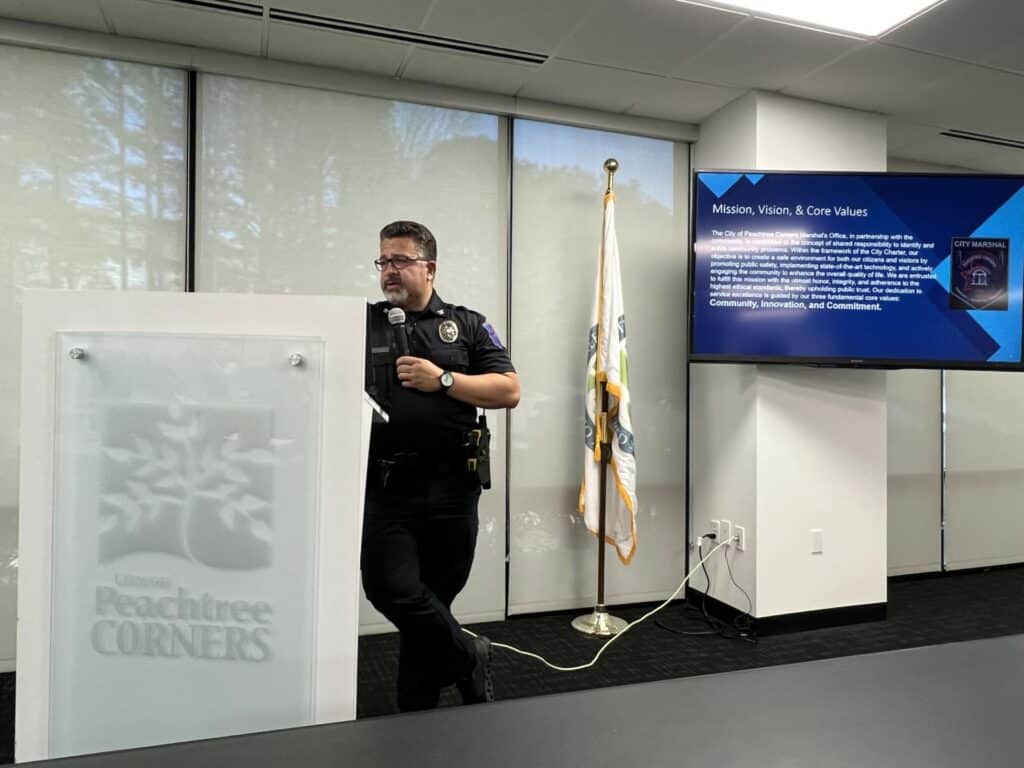
“We had a jewelry store robbery, and about the time we came in, we had started building up the camera registry as well as the integration system of cameras all around the city,” said Restrepo. “With only three of us, we have to rely on technology as much as we can.”
Although the marshals didn’t apprehend the bad guys, their assistance helped other law enforcement officers do their jobs more effectively. Several residents asked if there were plans to increase the marshal force to provide 24-hour, 7-day-a-week service.
The initial cost was around $900,000, said Christ, and maintaining the three officers and an administrative assistant will require about $700,000. Although Peachtree Corners doesn’t levy a property tax, the city’s share of county taxes goes toward that type of expense.
“It’s up to the people of Peachtree Corners if they want to increase the program,” said Christ. “It will come at a price.”
Those in attendance indicated that they thought that would be money well spent. Several said they liked seeing marshals at city-sponsored events because it sent a message that Peachtree Corners is serious about keeping its residents and visitors safe.
Christ said he and the rest of the council would consider that, but he reminded everyone that they should still report crimes to the police.
“I’ve had people tell me that they left a message on the city’s answering machine on a Friday evening and hadn’t heard back,” he said. “I tell them the first step is always to call 911.”
Catch the episode of the UrbanEBB podcast featuring Edward Restrepo from this past January here:
Related
City Government
Ora B. Douglass Swears in as First Black Female City Council Member of Peachtree Corners
Published
3 months agoon
January 20, 2024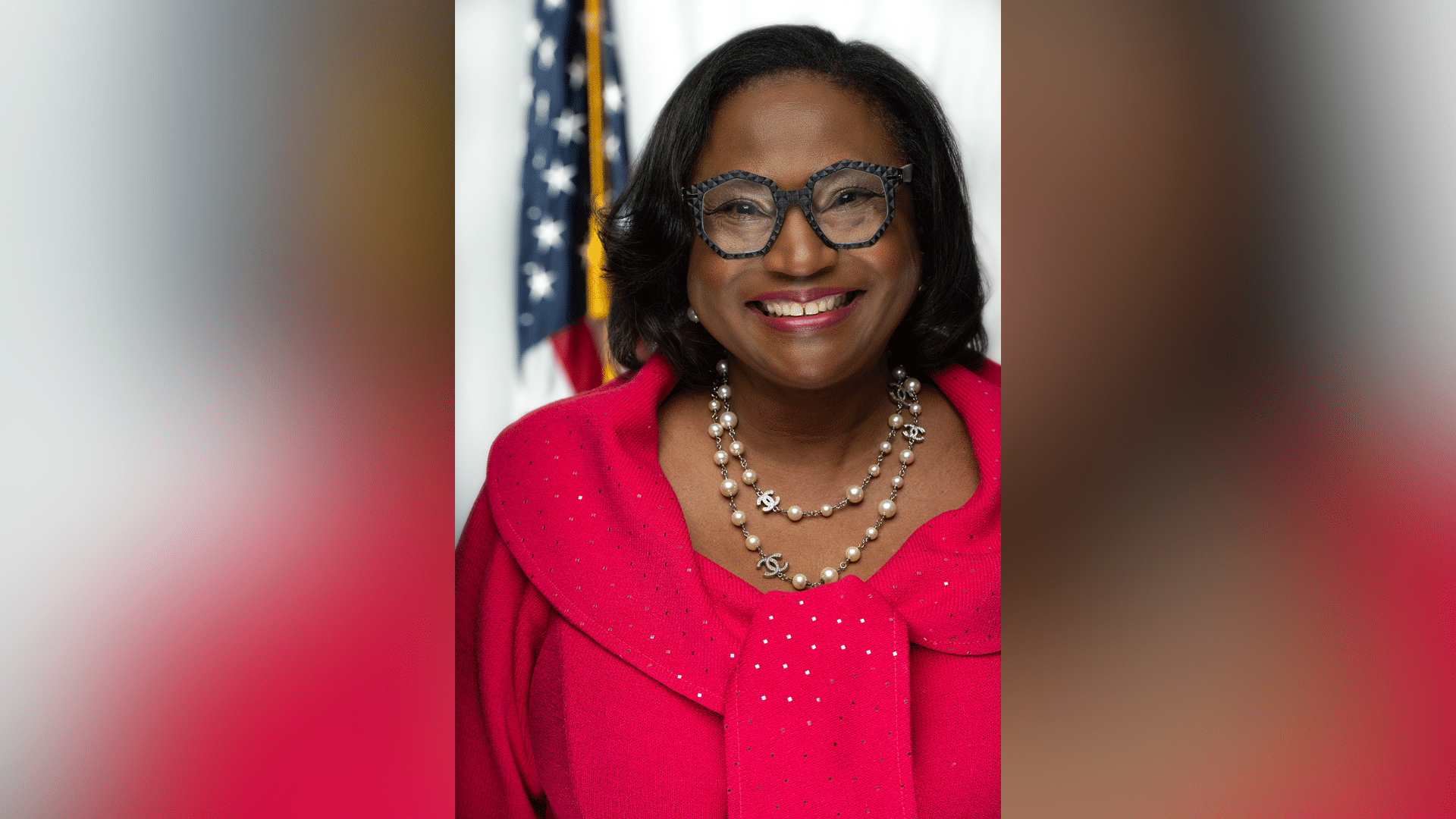
After a successful run for the position of Peachtree Corners City Council Post 5 Ora B. Douglass will be sworn in as Peachtree Corners’ first Black female city councilmember on Tuesday, Jan. 23 during the regular City Council meeting.
Upon her retirement, Douglass was elected to the seat vacated by Lorri Christopher, one of two females to serve on the Peachtree Corners City Council, the other was Jeanine Aulbach.
Douglass’ inauguration continues Peachtree Corners’ commitment to diversity and inclusion by not only electing its first woman of color, but by recognizing her status as a military veteran and an advocate for better health care, education and quality of life for all.
She earned her Bachelor of Science degree in nursing from Florida A&M University and earned a Master of Nursing degree at Emory University.
After graduating nursing school, Douglass was commissioned an officer in the U.S. Army Nurse Corps. A veteran with over 13 years of service, she has been stationed in Hawaii and was part of the U.S. Army Reserves.
Douglass has chaired the most recent Veteran’s Day event in Peachtree Corners and looks forward to more efforts to recognize and celebrate the multiple cultures and contributions of the residents.
With her long history of community service in the area, her motto has always been “service first.”
In 2014, she led a group of members in chartering the Psi Omega Omega chapter of Alpha Kappa Alpha Sorority Inc. in Peachtree Corners where she served as president for over four years.
Psi Omega Omega chapter provides community service to Peachtree Corners residents from high school students, senior citizens, entrepreneurs and those in need. In addition, the sorority has partnered with Gwinnett County to keep 1.6 miles of road clean on Peachtree Corners Circle.
Douglass also established The Georgia Pearls of Service Foundation (GPOS), a 501(c)(3) fundraising arm of her chapter and serves currently as president of the foundation.
The GPOS foundation raises funds each year to provide scholarships to high school students and donations to selected community service organizations.
Douglass was appointed International Chair of Community Programming, a committee with representation from the 10 regions of the AKA sorority in providing direction and oversight of the program from 2018 to 2022.
The program defined the framework for Alpha Kappa Alpha’s commitment to service that is embraced by its 300,000 members and over 1,000 chapters located throughout the world.
Douglass and her team partnered with Walgreens and traveled to 36 states including a Native American reservation and to the country of Honduras during the COVID-19 pandemic.
The group administered mammograms, COVID vaccines and provided testing to low-income citizens.
Douglass was born at Atlanta’s Grady Hospital, but was raised in Fort Pierce, Florida. Orphaned at 18 months old, Douglass hasn’t lived a charmed life.
She has worked hard for her accomplishments and knows the importance of a good education, perseverance, dedication and service to all mankind. She promises to utilize these qualities in service to the citizens of Peachtree Corners.
She has worked at numerous hospitals in the Atlanta area including Emory University, and Grady Hospital.
At Northside Hospital she was vice president of Quality and Risk Management. She served as director of Community Home Based Nursing at the Veterans Administration Medical Center in Atlanta and VA Medical Centers in Carrollton and Oakwood where she directed a $10 million grant to provide homecare services to our veterans.
Douglass has practiced progressive clinical, managerial and healthcare administration for over 30 years.
Douglass currently serves on the board of the Fowler YMCA in Peachtree Corners and is also a member of the Peachtree Corners Rotary Club. Douglass enjoys playing pickleball, traveling, cooking, gardening and providing boxes in her yard for Eastern bluebirds to nest each spring.
Douglass is married to Dr. Adrian Douglass. They have four children and three grandchildren. She and her husband are members of Friendship Baptist Church in Duluth.
For more information, go to www.peachtreecornersga.gov.
Click here for more Peachtree Corners City Government news.
Related
Business
The Mayor’s Look at Business and Innovation Successes in 2023
Published
4 months agoon
December 29, 2023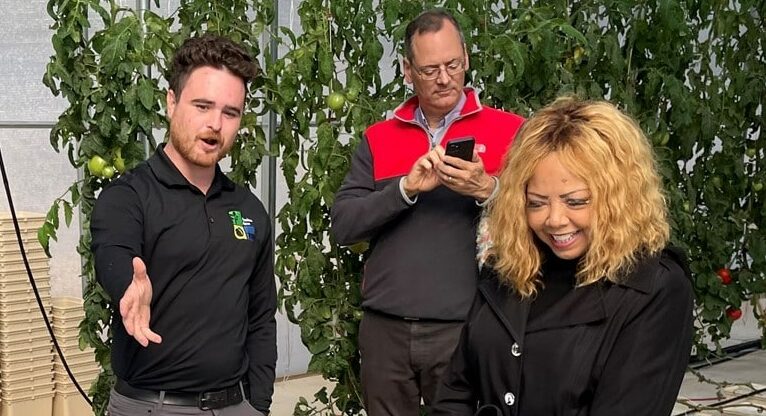
From Peachtree Corners Mayor Mike Mason
As the year comes to a close, it seems like a good time to consider our businesses and say ‘Thank You!’ for helping to ensure our city’s success.
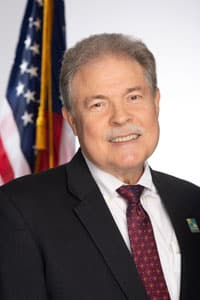
Business and innovation have always been at the heart of who we are as a community. We are a city that grew up organically around Technology Park. So, as we look back at 2023 at some of the many occurrences worth noting, I’d like to say ‘Thank You’ to our businesses, large and small.
And ‘thank you’ to all those entrepreneurs out there who had the courage to start their own businesses and put in the countless hours needed to make them successful. Without your success, we wouldn’t be here. Let’s look at some of the business activity in 2023.
In January, Fricke and Associates, a certified public accounting firm, consolidated two locations, bringing 25 new jobs and a $800,000 capital investment to the City of Peachtree Corners.
The firm signed a 9,000-square-foot office lease at 3500 Parkway Lane to help them better serve Metro Atlanta clients.
Early in the year, NAC International, a nuclear fuel cycle technology and consulting company, signed a deal for 23,000 square feet of space at 2 Sun Court in Peachtree Corners, while T-Mobile partnered with Curiosity Lab for a fun student hackathon the weekend of Feb. 24 to 26.
The city completed its second, five-year Economic Development Plan, this year. The plan guides activity, projects and policy aimed at improving the city’s economic climate.
The city also began its next Comprehensive Planning process, a plan renewed every year that guides development and redevelopment activity in the city.
Unlike other places, these plans don’t sit on a shelf here. We talk with our stakeholders, i.e. YOU, and develop plans to take us where you think we need to go. This is good old-fashioned logic at work, but back to our Year-in-Review.
Last January, city economic development staff visited a company in Peachtree Corners rather unsuspecting of the scope of the operation.
Guardian Sports manufactures products designed to keep people— especially young people—safer while playing sports. It is truly a gem. This Peachtree Corners company is designing and manufacturing sporting equipment worn by youth and high school football teams, college teams, and most recently, mandated by the NFL.
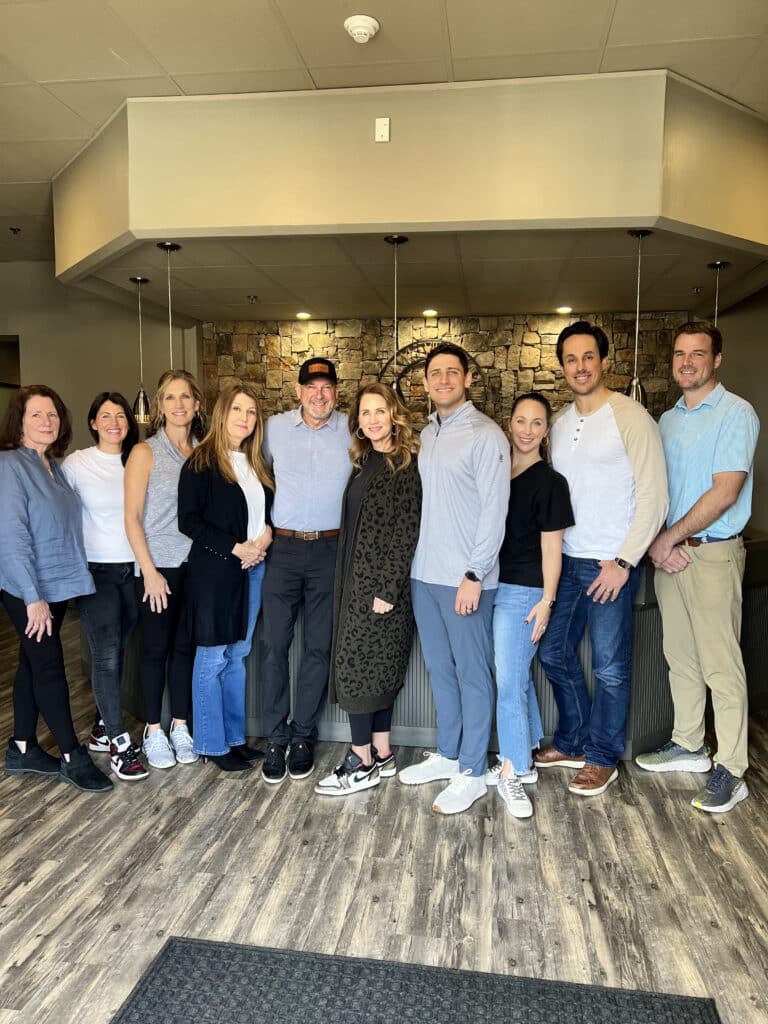
The company’s flagship product is the Guardian Cap, which was created to advance the standard football helmet by dispersing some of the energy that is generated during impacts. Check out a video HERE.
Insight Sourcing celebrated 20 years in business, announcing 20% firmwide growth in 2022, with 84 new team members added, of whom 23 joined as part of an acquisition.
Global Aviation celebrated 25 years of success while at the same time launching another company in the aerospace industry.
In February, the city began encouraging businesses to connect their security cameras with the Fusus network. Fusus is a nationally recognized public safety technology provider that has operated out of its headquarters in—you guessed it–Peachtree Corners since 2019.
The platform links cameras together and sends the feed to the West Precinct where Gwinnett Police officers can see situations in real-time and respond accordingly.
The cameras have helped solve homicides and other crimes in various cities, including Peachtree Corners. In July, Fusus made the annual Inc. 5000 list, the most prestigious ranking of the fastest-growing private companies in America.
Peachtree Farm, located in Technology Park, began attracting some attention on a grand scale this year, starting with a visit from Arthur Tripp Jr., the executive director of the USDA Farm Service Agency who visited Peachtree Farm in February.
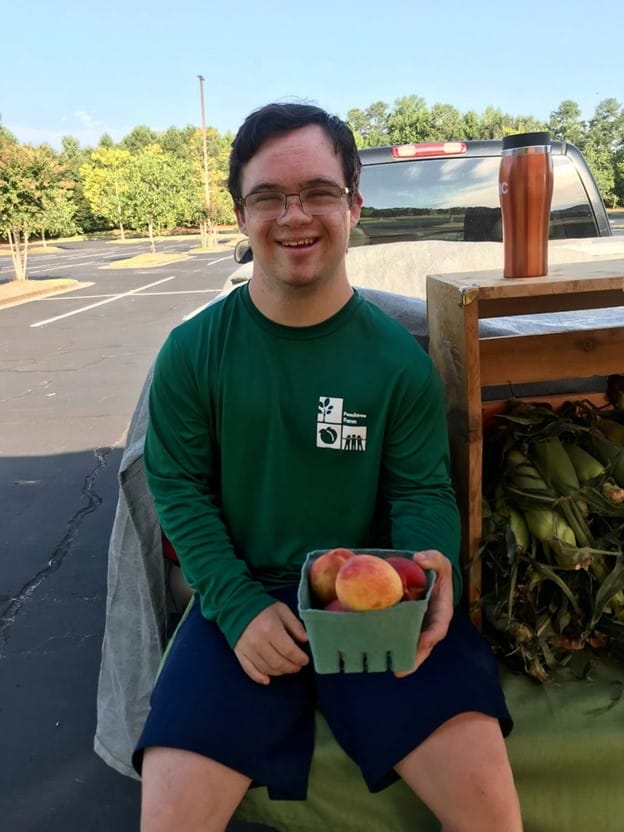
Members of the Gwinnett County Farm Bureau and the Georgia Farm Bureau also visited Peachtree Farm in June to learn more about its operations and areas for possible collaboration.
Congresswoman Lucy McBath visited the farm this fall. The farm, located on Research Court, provides an inclusive and accessible community fostering the social, emotional and physical health and wellness of adults with disabilities.
Peachtree Farm first opened in 2021 to create jobs for those with intellectual and developmental disabilities.
In April, professional cyclists descended on Technology Parkway participating in the Curiosity Lab Criterium, a series of races on the streets of Peachtree Corners within the living laboratory environment of Curiosity Lab.
In May, North American Properties broke ground on The Forum redevelopment project, a great relief as there had been concerns about how to best generate more activity at the 20-year-old center.
North American Properties is redeveloping and revitalizing the property, adding a boutique hotel, food hall, open green spaces, new retail spaces and 381 apartments.
A 300-space parking deck will be constructed near Belk to allow for some parking to be reconstructed as open green space. Several new stores and restaurants have opened or are opening at The Forum, including Peche, lululemon and High Country Outfitters as well ass Petfolk Veterinarian clinic.
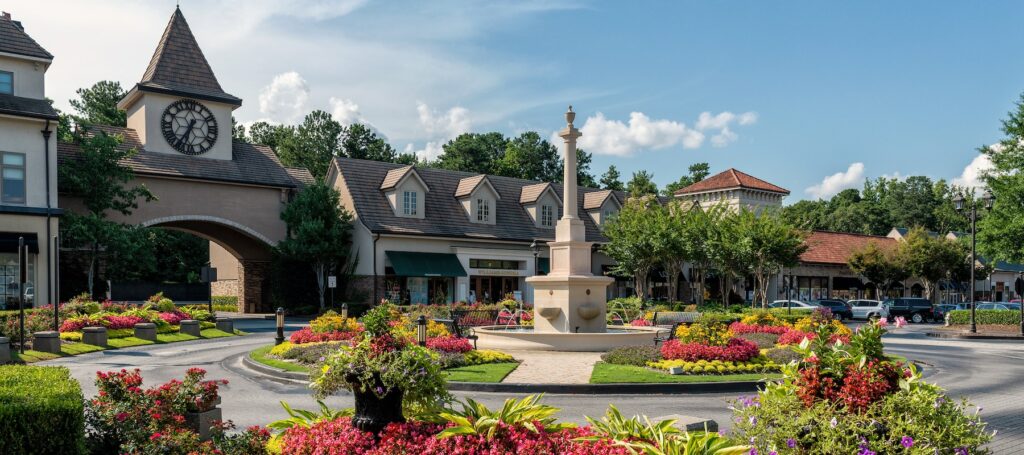
Politan Row will open at the Forum, part of the multi-million dollar renovation project by North American Properties. Politan Row, which has locations at Colony Square in Atlanta, as well as Houston and Chicago, will include seven independently owned restaurant spaces, a full bar, an outdoor patio along greenspace and a standalone restaurant and wine bar.
The German American Chamber of Commerce visited Curiosity Lab in May to learn more about Georgia, Gwinnett County and specifically Peachtree Corners. Also, a delegation of energy, technology and sustainability leaders visited the City of Peachtree Corners in October for several days, learning about area companies, Curiosity Lab and about how the city developed.
This year, Seoul Robotics established its United States office in Curiosity Lab at Peachtree Corners. The company’s presence in Curiosity Lab is fueling further development of a groundbreaking 3D perception platform.
Also this year, Siemens joined Curiosity Lab to support bringing 5G charging and electrification solutions to the United States.
Soliant, a leading provider of specialized healthcare and education staffing services, has been hiring hundreds of new employees across five offices in the Southeast. This expansion of approximately 300 people will give Soliant the internal resources to meet the growing nationwide demand for healthcare and education professionals.
Also, in terms of health and wellness, Atlas Behavioral Health opened at 3850 Holcomb Bridge Road while space was outfitted in June at 4941 S Old Peachtree Road for a Fyzical Therapy and Balance Center.
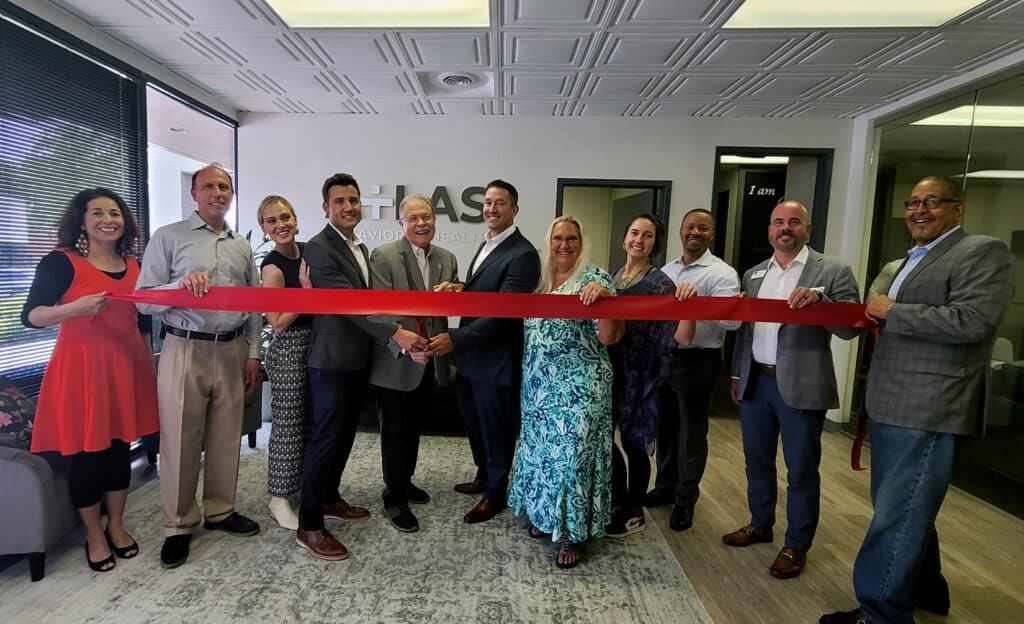
In June, Peachtree Corners was ranked #1 in Georgia and #19 in the nation in this year’s edition of the Fortune 50 Best Places to Live for Families. In August, Peachtree Corners was listed as one of the best places to live in Georgia by Niche.com.
On the environmental front, I can think of a few things coming out of Peachtree Corners this year which will likely help the world.
For example, Sidel, which manufactures packaging (among other things), has introduced a new bottle. Sidel announced a partnership with Coca-Cola Europacific Partners.
The company has been experiencing a great deal of growth and continues to hire more and more people. The bottle, which is for carbonated soft drinks, has a lighter neck and tethered cap. The tethered caps are expected to boost collection and recycling efforts, while preventing litter.
Pond Constructors Inc., Peachtree Corners, was awarded a $13 million modification contract to maintain and repair capitalized petroleum systems and facilities at the Joint Base Pearl Harbor-Hickam, Hawaii.
Also, ASHRAE (the American Society of Heating Refrigerating, and Air Conditioning Engineers) has published a pioneering code-enforceable standard developed to reduce the risk of infectious aerosol transmission in buildings.
There was some other activity in Technology Park as well. Specifically, ASBN Coworks opened at 420 Technology Parkway, in the heart of Tech Park.
DW1, previously known as Discount Waste, Inc., cut the ribbon on its new office at 250 Scientific Drive NW.
A Florida-based investment firm acquired four properties in Technology Park in August, all part of a portfolio selling for roughly $23.8 million.
The second-largest sale in Metro Atlanta that quarter, SF Partners purchased 30, 35 Technology Parkway South and 190 and 192 Technology Parkway from Terracap; a total of 247,208 square feet.
Thank you for reading about some of the impressive business happenings in our city this year. As we gear up for 2024, we looked forward to hearing about more successes, and helping to make sure the city’s businesses continue to grow and thrive.
Happy Holidays!
Mike Mason, Mayor
Related
Read the Digital Edition
Subscribe
Keep Up With Peachtree Corners News
Join our mailing list to receive the latest news and updates from our team.
You have Successfully Subscribed!

Exploring Israeli Innovation in the Smart City Sector with Einav Gabbay [Podcast]

BRACK: Peachtree Corners to lose Peterbrooke Chocolatier

Georgia United Methodist Foundation Announces Changes to Finance Team

North American Properties Revitalizes Avenue East Cobb

Spring Voting Will Determine Important Gwinnett School Board Elections

Kendra Scott Opens New Store At The Forum

Local Non-profit Boy With a Ball Announces Dates for Upcoming Conference

What’s in Store for The Forum Peachtree Corners for 2024

What’s in Store for The Forum Peachtree Corners for 2024

Kendra Scott Opens New Store At The Forum

Local Non-profit Boy With a Ball Announces Dates for Upcoming Conference

Spring Voting Will Determine Important Gwinnett School Board Elections

BRACK: Peachtree Corners to lose Peterbrooke Chocolatier

Georgia United Methodist Foundation Announces Changes to Finance Team

North American Properties Revitalizes Avenue East Cobb

Exploring Israeli Innovation in the Smart City Sector with Einav Gabbay [Podcast]

Light up the Corners [Video]

Capitalist Sage: Business Leadership in Your Community [Podcast]

Cliff Bramble: A Culinary Adventure through Italy

Top 10 Brunch Places in Gwinnett County

A Hunger for Hospitality

THE CORNERS EPISODE 3 – BLAXICAN PART 1

Top 10 Indoor Things To Do This Winter

The ED Hour: What it takes to Remove Barriers from Education
Peachtree Corners Life
Topics and Categories
Trending
-
Business1 week ago
BRACK: Peachtree Corners to lose Peterbrooke Chocolatier
-
Education6 days ago
Spring Voting Will Determine Important Gwinnett School Board Elections
-
Business2 days ago
Kendra Scott Opens New Store At The Forum
-
Doing Good4 days ago
Local Non-profit Boy With a Ball Announces Dates for Upcoming Conference









